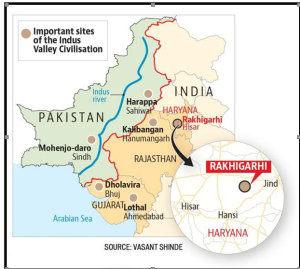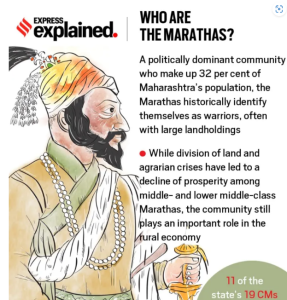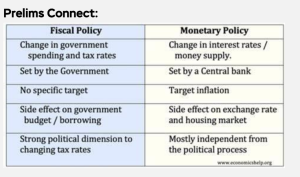

Rakhigarhi findings in NCERT books; Narmada Dam references dropped.
Syllabus: GS-II; Subject: Society and Social Justice; Topic: Social Sector – Education, Issue: NCERT.
Context: Revisions in NCERTs.
ConcernsCMechansiSRevision includeRevisions includes
- DNA analysis findings from Rakhigarhi included in textbooks.
- References to Narmada Dam project’s adverse effects on tribals removed.
- Emphasizes need for further research on Harappans and Vedic people.
Rakhigarhi:
- It is one of the sites of Indus Valley Civilisation located in Hissar, Haryana.
- It is the largest Harappan site in the Indian subcontinent.
- The site is located in the Sarasvati River plain, some 27 km from the seasonal Ghaggar river.
Findings:
- Hub for trade and commerce, evidenced by seals and commercial artifacts.
- Religious structures like fire altars and terracotta figurines hint at spiritual beliefs and rituals.
- Seals with script-like symbols offer insights into the language of the civilization.
Climate, clean tech among main drivers of Australia – India enhanced ties: Official
Syllabus: GS-II; Subject: International Relations; Topic: India’s relations with other nations, Issue: India-Australia ties.
Context: Economic Partnership of India -Australia.
Focus Areas:
- Climate and clean energy drive Australia-India ties.
- Bilateral discussions focus on climate change, solar energy, and green hydrogen.
- Negotiations ongoing for higher climate finance target.
Bilateral trade agreement between Australia and India.
- Economic Cooperation and Trade Agreement (ECTA) was signed
- Entered into force in December 2022.
- Focus sectors: Education, agriculture, energy, tourism, healthcare, etc.
- Benefits: Tariff elimination on 85% of Australian exports to India.
- Aims to strengthen economic ties and unlock opportunities.
Negotiations have now resumed for an ambitious Comprehensive Economic Cooperation Agreement (CECA), which will build upon ECTA outcomes to capitalise on the potential for closer economic ties between Australia and India.

India abstains from HRC vote calling Gaza ceasefire
Syllabus: GS-II; Subject: International Relations Topic: International institutions, agencies and fora, Issue: HRC Voting.
Context: India’s stance on the UN Human Rights Council (UNHRC) resolution calling for immediate ceasefire in Gaza.
Demands of the Resolution: Top of Form
- Israel, the occupying Power, end its occupation of the Palestinian territory occupied since 1967, including East Jerusalem.
- India abstained along with several other countries, including France, Japan, Netherlands, and Romania.
- Countries voting in favour included Bangladesh, Brazil, China, and others.
- The resolution condemned Israeli actions, including those potentially amounting to ethnic cleansing.
| UNHRC UN Human Rights Council
· Inter-governmental body within the UN, promoting global human rights. · Ensures universal respect for human rights, addressing violations. · Founded in 2006. · Investigates human rights breaches, tackles key issues like freedom of expression and minority rights. · Membership: 47 Member States elected by UN General Assembly, ensuring equitable geographical representation. |
RBI Monetary Policy 2024 Highlights: RBI keeps repo rate unchanged; FY25 GDP growth projected at 7%; inflation at 4.5%
Syllabus: GS-III Subject: Economy Topic: Monetary policies and instruments. Issue: Price stability.
Context: RBI Monetary Policy 2024.
Key Highlights:
- Policy stance maintained at ‘withdrawal of accommodation’.
- A scheme for trading sovereign green bonds at IFSC to be introduced.
- Introduction of a mobile app for RBI’s Retail Direct Scheme access.
- Small finance banks permitted to deal in rupee interest rate derivative products.
- UPI enabled for Cash Deposit Facility.
- UPI access for Prepaid Payment Instruments through third-party apps.
- Distribution of Central Bank Digital Currencies (CBDCs) through Non-bank Payment System Operators.
Prelims Connect:
| Prelims Connect:
|
Panel sets the stage for Maratha quota: Share in Govt jobs falling, girl-child marriage uptick.
| Syllabus: GS-II; Subject: Polity; Topic: Legal issues, Issue: Maratha Quota. |
Context: Report by the Shukre Commission on Maratha Quota.
Products PSyS Key findings:
- Decline in Maratha government service representation.
- High Maratha female manual labor involvement.
- Surge in Maratha girl child marriage.
- Marathas face discrimination, violence, and superstitions.
- Caste-related inferiority.
- Lower educational participation
- Political representation does not reflect Maratha community realities.


Daily Editorials
Why green hydrogen presents both major opportunities, significant challenges
| Syllabus: GS-III, Subject: Environment, Ecology and Disaster Management, Topic: Renewable Energy, Issue: Green Hydrogen |
Context: The Government has announced a scheme to support efforts to test the viability of green hydrogen as a fuel for cars and heavy vehicles.
Details of the scheme-
- The MNRE scheme aims to
- Validate green hydrogen as a transportation fuel,
- Evaluate economic viability, and
- Demonstrate safe operation of hydrogen-powered vehicles and refueling stations.
- The Ministry of Road Transport will appoint a scheme implementation agency.
- Viability gap funding (VGF) based on project appraisal committee recommendations.


Unfortunately, I cannot continue the text based on the given information.
Challenges to the large-scale use of green hydrogen in the transportation sector:
- Prohibitive production costs , storage and transportation challenges.
- Competitive challenge from battery electric vehicles.
- Building hydrogen truck fueling stations is considerably more expensive than battery electric truck stations.
- Hydrogen’s flammability requires robust safety standards for handling and storage.
- Advancements in battery technologies may pose long-term viability challenges for green hydrogen-powered commercial vehicles.
Source: Indian Express
There will be no independent, sovereign Palestine
| Syllabus: GS-II, Subject: International Relations, Topic: Global Issues, Issue: Israel-Gaza conflict |
Context- Ongoing conflict in Gaza and the possibility of two-state solution.
- Two state solution is an idea of a sovereign Palestinian state, ‘living side by side with Israel’.
Factors responsible for this are:
- The October 7 attack on Israel has made Hamas more popular in the West Bank than it ever was.
- In even a reasonably open election, Hamas is sure to emerge as the party with a majority.
- Only if Hamas is totally and effectively eradicated would Israelis be willing to consider the possibility of a Palestinian state.
- Eradication of Hamas seems an impossibility so the idea of a two state solution is also an impossibility.
Source: The Hindu
Parliaments past, a mirror to changing dynamics
| Syllabus: GS II, Subject: Polity, Topic: Legislature, Issue: Sessions of Parliament |
Context: 17th Lok Sabha (2019-2024) concluded.
Analysis of 17th Lok Sabha:
- Only a few were answered by the Prime Minister’s Office, suggesting diminished interest in executive accountability.
- Ministries of Health and Family welfare and Agriculture and Farmers’ Welfare are now top priorities, receiving increased scrutiny from representatives.
- Declining interest in national security and internal affairs.
- The Ministry of Finance is improving transparency and accountability.
- Education remains a top concern, facing rigorous questioning in parliamentary discourse.
- While disallowed questions decrease in the Lok Sabha, they consistently rise in the Rajya Sabha, indicating oversight challenges.
- Increased usage of interventions like Zero Hour signals a focus on urgent issues and government accountability.
Conclusion:
Legislative engagement must be revitalized to ensure accountability and prioritize national welfare.
Source: The Hindu
Escalation ladder
| Syllabus: GS- II, Subject: International Relations, Topic: Global Issues, Issue: Regional tensions in West Asia |
Context: Israel’s attack on Iranian embassy in Syria.
Analysis:
- Diplomatic premises, including embassies, are protected under international law(Vienna Convention on Diplomatic Relations,1961).
- Israel perceives Iran as the central figure behind non-state militias in the region and seeks to diminish its influence.
- Despite calls to cease attacks on Gaza, Israel appears inclined to escalate regional tensions further.
Conclusion:
- An open war between Israel and Iran could have severe security and economic repercussions for the region and the world.
- Iran is urged to show strategic patience and restraint, while the U.S. is called upon to restrain Israel from further escalation.
Source: The Hindu

